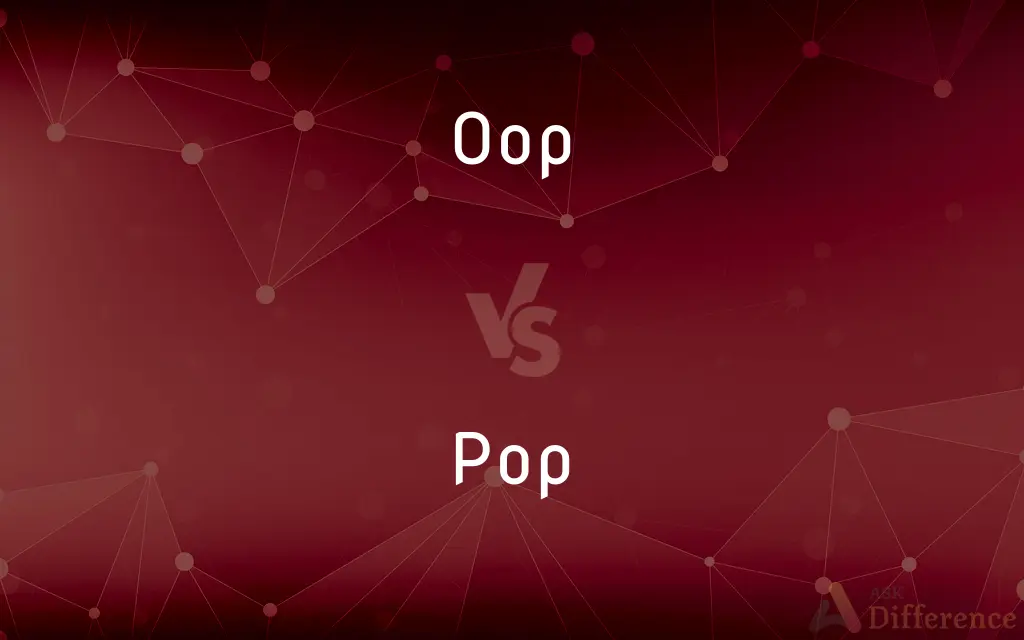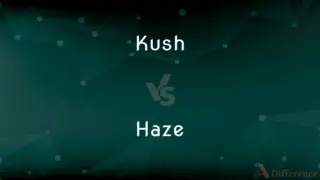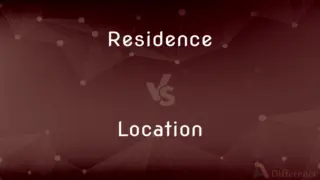OOP vs. POP — What's the Difference?
By Maham Liaqat & Fiza Rafique — Updated on May 15, 2024
OOP, or Object-Oriented Programming, structures code around objects and classes, focusing on modularity and reuse; POP, or Procedural Oriented Programming, organizes code into procedures or functions, emphasizing a step-by-step approach.

Difference Between OOP and POP
Table of Contents
ADVERTISEMENT
Key Differences
OOP structures programs around objects, which encapsulate both data and methods relevant to that data. This contrasts with POP, where the program is structured around functions or procedures, which operate on data externally passed to them. In OOP, data manipulation is internal to the object, enhancing data security and minimizing unintended data manipulation.
In OOP, inheritance allows new objects to adopt the properties of existing ones, promoting code reuse and reducing redundancy. POP does not support inheritance; instead, it relies on a linear sequence and logical steps within procedures to achieve program tasks, often leading to code duplication.
OOP supports polymorphism, allowing methods to perform different functions based on the object calling them. This flexibility is absent in POP, where functions are generally static and perform the same operations regardless of the context in which they are called.
Encapsulation in OOP hides the internal state of objects from the outside world, exposing only what is necessary via methods. This concept of data hiding helps in maintaining integrity and reducing system complexity. POP, by its nature, does not encapsulate data, often leading to less secure and more error-prone code as it scales.
OOP is typically used in complex systems requiring a high level of maintainability, scalability, and security, such as software for banking systems or dynamic web applications. POP is often reserved for simpler, smaller tasks where a quick, straightforward procedural approach can be more efficient and easier to implement.
ADVERTISEMENT
Comparison Chart
Programming Structure
Based around objects and classes
Based around functions or procedures
Code Reusability
High due to inheritance and polymorphism
Low, often involves code duplication
Approach to Data
Encapsulates data within objects
Data is passed to procedures
Flexibility
High, methods can vary by object
Low, functions are static
Typical Use Cases
Complex systems like GUI applications
Smaller, straightforward tasks
Compare with Definitions
Oop
Emphasizes reusability through inheritance and polymorphism.
A ElectricCar class in OOP can inherit from a Car class, gaining all its attributes and behaviors without needing to rewrite the code.
Pop
A programming paradigm that uses procedures or routines to perform tasks.
In POP, a procedure to perform a calculation might simply take input, process it, and return a result.
Oop
Supports abstraction, simplifying complex realities using class hierarchies.
In OOP, an abstract Animal class can be used to represent general characteristics of all animals.
Pop
Focuses on a step-by-step procedural approach to problem-solving.
A typical POP application might involve a clear sequence of actions, like reading data, processing it, and then outputting results.
Oop
A programming paradigm based on the concept of "objects", which can contain data and code: data in the form of fields, and code, in the form of procedures.
In OOP, a Car object might have fields like color and make, and methods like start or stop.
Pop
Lacks support for inheritance and polymorphism.
Each function in POP must be self-contained, and any repetition of functionality must be explicitly coded.
Oop
Encourages data encapsulation and modularity.
OOP allows an object to hide its internal states and only expose behaviors, making it easier to manage large codebases.
Pop
Typically used for smaller or less complex tasks.
Writing a simple script to automate the renaming of hundreds of files is a task well-suited to POP.
Oop
Suitable for applications where code reusability, scalability, and flexibility are crucial.
OOP is favored in software development for systems like online shopping platforms, where managing different product types and behaviors efficiently is critical.
Pop
To make a short, sharp, explosive sound.
Oop
(regional) up
Pop
To burst open with a short, sharp, explosive sound.
Oop
To bind with a thread or cord; to join; to unite.
Pop
To move quickly or unexpectedly; appear abruptly
At last the cottage popped into view.
Pop
To open wide suddenly
The child's eyes popped with astonishment.
Pop
To have the eustachian tubes open suddenly, equalizing pressure on both sides of the eardrum in response to changes in atmospheric pressure, as in a descending airplane
After I swallowed, my ears popped.
Pop
(Baseball) To hit a short high fly ball, especially one that can be caught by an infielder
Popped out to shortstop.
Pop
To shoot a firearm, such as a pistol.
Pop
To be exciting
A club that really pops at night.
Pop
To be visually striking
A logo that really pops.
Pop
To cause to make a sharp bursting sound.
Pop
To cause to open with a sharp bursting sound
Popped the hood of the car to check the oil.
Pop
To cause to explode with a sharp bursting sound
Popped the balloon.
Pop
To put or thrust suddenly or unexpectedly
"popping a crisp plump shrimp into her mouth" (Kathleen Winsor).
Pop
To discharge (a firearm).
Pop
To fire at; shoot.
Pop
To hit or strike
Popped me on the head.
Pop
(Baseball) To hit (a ball) high in the air but not far.
Pop
To release (a clutch) suddenly.
Pop
To take (drugs), especially orally
"To calm a case of the jitters ... the bride popped Valium" (People).
Pop
To have (a drink)
Popped a few beers after work.
Pop
(Slang) To take into legal custody; arrest
"Her friend was visiting and got popped for a DUI while he was driving her car" (Jamie Harrison).
Pop
A sudden sharp, explosive sound.
Pop
A shot with a firearm.
Pop
Chiefly Midwestern US See soft drink. See Note at tonic.
Pop
(Baseball) A pop fly.
Pop
Father.
Pop
Popular music.
Pop
Pop art.
Pop
With a popping sound.
Pop
Abruptly or unexpectedly.
Pop
Of or for the general public; popular or popularized
Pop culture.
Pop psychology.
Pop
Of, relating to, or specializing in popular music
A pop singer.
Pop
Of or suggestive of pop art
A pop style.
Pop
(countable) A loud, sharp sound, as of a cork coming out of a bottle.
Listen to the pop of a champagne cork.
Pop
An effervescent or fizzy drink, most frequently nonalcoholic; soda pop.
Lunch was sandwiches and a bottle of pop.
Pop
A bottle, can, or serving of effervescent or fizzy drink, most frequently nonalcoholic; a soda pop.
Go in the store and buy us three pops.
Pop
A pop shot: a quick, possibly unaimed, shot with a firearm.
The man with the gun took a pop at the rabbit.
Pop
A quantity dispensed; a portion; apiece.
They cost 50 pence a pop.
Pop
Something that stands out or is distinctive to the mind or senses.
A white dress with a pop of red
A pop of vanilla flavour
Pop
(computing) The removal of a data item from the top of a stack.
Pop
A bird, the European redwing.
Pop
(physics) The sixth derivative of the position vector with respect to time (after velocity, acceleration, jerk, jounce, crackle), i.e. the rate of change of crackle.
Pop
A pistol.
Pop
A small, immature peanut, boiled as a snack.
Pop
(colloquial) freeze pop
Pop
A (usually very) loud audience reaction.
Pop
One's father.
My pop used to tell me to do my homework every night.
Pop
Pop music.
Pop
A Russian Orthodox priest; a parson.
Pop
(intransitive) To make a pop, or sharp, quick sound.
The muskets popped away on all sides.
Pop
(ergative) To burst (something) with a popping sound.
The boy with the pin popped the balloon.
This corn pops well.
Pop
To enter, or issue forth, with a quick, sudden movement; to move from place to place suddenly; to dart.
A rabbit popped out of the hole.
Pop
To place (something) (somewhere); to move or position (something) with a short movement.
Just pop it in the fridge for now.
He popped his head around the door.
Pop
To make a short trip or visit.
I'm just popping round to the newsagent.
I'll pop by your place later today.
Pop
(intransitive) To stand out; to be distinctive to the senses.
This colour really pops.
Pop
(transitive) To hit (something or someone).
He popped me on the nose.
Pop
To shoot (usually somebody) with a firearm.
Pop
To ejaculate; to orgasm.
Pop
To remove (a data item) from the top of a stack.
Pop
To give birth.
Pop
To pawn (something) (to raise money).
I had to pop my watch to see me through until pay-day.
Pop
To swallow or consume (especially a tablet of a drug, sometimes extended to other small items such as sweets or candy).
Pop
To perform (a move or stunt) while riding a board or vehicle.
Pop
To undergo equalization of pressure when the Eustachian tubes open.
My ears popped as the aeroplane began to ascend.
Pop
(dance) To perform the popping style of dance.
Pop
To arrest.
He's on probation. We can pop him right now for gang association.
Pop
Used to represent a loud, sharp sound, as of a cork coming out of a bottle.
Pop
(used attributively in set phrases) Popular.
Pop
A small, sharp, quick explosive sound or report; as, to go off with a pop.
Pop
A nonalcoholic carbonated beverage; - so called because it expels the cork with a pop from the bottle containing it; as, ginger pop; lemon pop, etc.
Pop
The European redwing.
Pop
To make a pop, or sharp, quick sound; as, the muskets popped away on all sides.
Pop
To enter, or issue forth, with a quick, sudden movement; to move from place to place suddenly; to dart; - with in, out, upon, off, etc.
He that killed my king . . . Popp'd in between the election and my hopes.
A trick of popping up and down every moment.
Pop
To burst open with a pop, when heated over a fire; as, this corn pops well.
Pop
To thrust or push suddenly; to offer suddenly; to bring suddenly and unexpectedly to notice; as, to pop one's head in at the door.
He popped a paper into his hand.
Pop
To cause to pop; to cause to burst open by heat, as grains of Indian corn; as, to pop corn or chestnuts.
Pop
To eat or swallow; - of food, especially snacks, in small pieces; as, he popped a whole can of peanuts while watching the movie.
Pop
Like a pop; suddenly; unexpectedly.
Pop
An informal term for a father; probably derived from baby talk
Pop
A sweet drink containing carbonated water and flavoring;
In New England they call sodas tonics
Pop
A sharp explosive sound as from a gunshot or drawing a cork
Pop
Music of general appeal to teenagers; a bland watered-down version of rock'n'roll with more rhythm and harmony and an emphasis on romantic love
Pop
Bulge outward;
His eyes popped
Pop
Hit a pop-fly;
He popped out to shortstop
Pop
Make a sharp explosive noise;
The cork of the champagne bottle popped
Pop
Fire a weapon with a loud explosive noise;
The soldiers were popping
Pop
Cause to make a sharp explosive sound;
He popped the champagne bottle
Pop
Appear suddenly or unexpectedly;
The farm popped into view as we turned the corner
He suddenly popped up out of nowhere
Pop
Put or thrust suddenly and forcefully;
Pop the pizza into the microwave oven
He popped the petit-four into his mouth
Pop
Release suddenly;
Pop the clutch
Pop
Hit or strike;
He popped me on the head
Pop
Drink down entirely;
He downed three martinis before dinner
She killed a bottle of brandy that night
They popped a few beer after work
Pop
Take drugs, especially orally;
The man charged with murder popped a valium to calm his nerves
Pop
Cause to burst with a lound, explosive sound;
The child popped the balloon
Pop
Burst open with a sharp, explosive sound;
The balloon popped
This popcorn pops quickly in the microwave oven
Pop
(of music or art) new and of general appeal (especially among young people)
Pop
Like a pop or with a pop;
Everything went pop
Pop
Efficient for tasks where straightforward procedural control and simplicity are preferred.
POP can be ideal for writing quick, disposable code intended for one-off tasks in data analysis.
Common Curiosities
Is POP suitable for large software applications?
Generally, POP is not suitable for large applications as it lacks features like data encapsulation and inheritance, which help manage complexity.
How does OOP enhance code reusability?
OOP enhances reusability through mechanisms like inheritance and polymorphism, allowing programmers to use and adapt existing code with minimal changes.
Can POP handle multiple data types as effectively as OOP?
POP can handle multiple data types, but it often requires more explicit management compared to OOP’s more fluid handling through class and object structures.
What is Procedural Oriented Programming (POP)?
POP is a programming approach that involves programming using procedures or routines, also known as functions.
Can you explain polymorphism in OOP?
Polymorphism in OOP allows objects to interact in different ways depending on their data or class.
What makes OOP different from POP in terms of flexibility?
OOP offers greater flexibility through its use of inheritance and polymorphism, allowing for more dynamic and adaptable code.
What is Object-Oriented Programming (OOP)?
OOP is a programming paradigm based on the concept of organizing software around data, or objects, rather than functions and logic.
How does encapsulation benefit OOP?
Encapsulation helps protect data integrity by hiding the internal state of an object from outside interference and misuse.
What are typical use cases for OOP?
OOP is used in complex and scalable software solutions, including web applications, gaming engines, and enterprise systems.
What are typical use cases for POP?
POP is best suited for smaller, less complex programs where a straightforward procedural approach is effective.
How do OOP and POP approach error handling?
OOP handles errors more robustly by encapsulating and managing exceptions within object behaviors, whereas POP requires explicit error handling spread across various functions.
What is an example of a problem better solved by OOP than POP?
Complex software systems such as a CRM system benefit more from OOP due to its scalability and maintainability features.
Is there a performance difference between OOP and POP?
OOP might introduce some overhead due to its more complex features, whereas POP can be more performance-efficient for simple tasks.
Why is code duplication more common in POP?
POP lacks mechanisms like inheritance, leading to more frequent repetition of similar code across different parts of a program.
How does inheritance work in OOP?
Inheritance in OOP allows a class to inherit attributes and methods from another class, promoting code reuse and efficiency.
Share Your Discovery

Previous Comparison
Kush vs. Haze
Next Comparison
Residence vs. LocationAuthor Spotlight
Written by
Maham LiaqatCo-written by
Fiza RafiqueFiza Rafique is a skilled content writer at AskDifference.com, where she meticulously refines and enhances written pieces. Drawing from her vast editorial expertise, Fiza ensures clarity, accuracy, and precision in every article. Passionate about language, she continually seeks to elevate the quality of content for readers worldwide.
















































